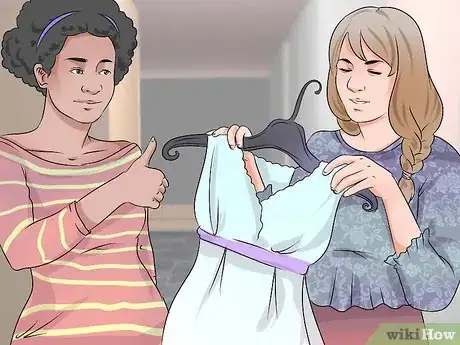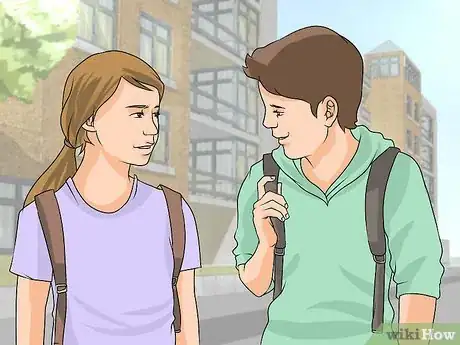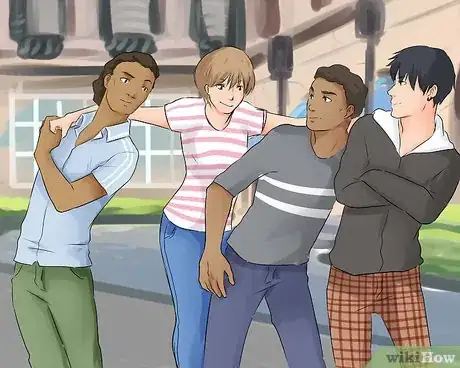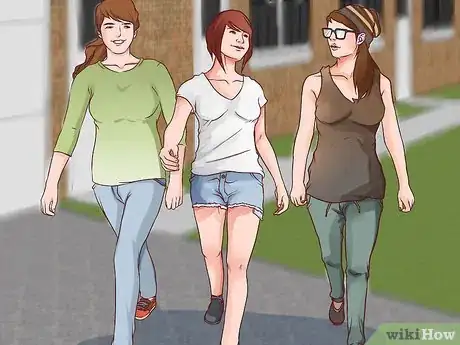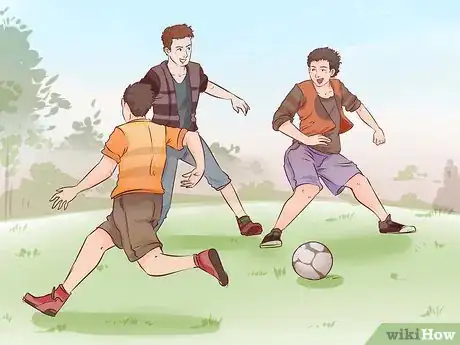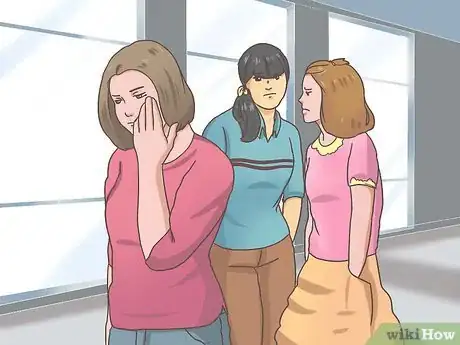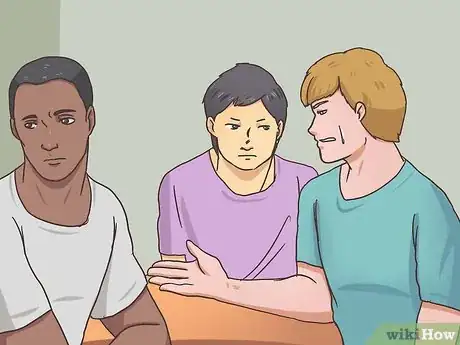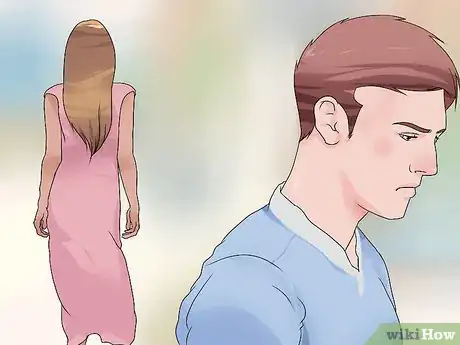This article was co-authored by Trudi Griffin, LPC, MS. Trudi Griffin is a Licensed Professional Counselor in Wisconsin specializing in Addictions and Mental Health. She provides therapy to people who struggle with addictions, mental health, and trauma in community health settings and private practice. She received her MS in Clinical Mental Health Counseling from Marquette University in 2011.
wikiHow marks an article as reader-approved once it receives enough positive feedback. This article received 13 testimonials and 92% of readers who voted found it helpful, earning it our reader-approved status.
This article has been viewed 239,776 times.
Building healthy friendships is an important part of your social life. Friends can have a major influence on how you think, feel, and behave.[1] You should look for friends that have good qualities and seek out new friends that are positive and supportive. Also, try to avoid negative friends so you can maintain a healthy, active social life.
Steps
Looking For Good Qualities in Your Friends
-
1Make sure your friends offer emotional support and guidance. Good friends will be willing to support you on a consistent basis, through your high points and your low points. Your friends should offer to support you during any difficult emotional times and be there for you in a real, genuine way. They may also offer guidance and advice when you need it.[2] [3]
- For example, if you're going through a rough break up, a good friend would check in on you daily and try to distract you by taking you out.
- Good friends offer advice, support, and guidance during difficult times, and only when you ask for it. They support your decisions, even if they don't agree.
-
2Determine if you have a good balance of give and take. Good friendships also have a good balance of giving and taking, where you feel mutually supported. You should try to cultivate friendships where there is a balance of give and take, and where you do not feel you are giving or taking more than the other person.[4]
- Some people are givers; they'll do anything to help and support someone. Others are takers; they'll take someone else’s time and energy to fulfill their own needs.
- While natural givers may sound like the way to go, you should actually look for friends who can maintain a balance between both of these two extremes.
Advertisement -
3Decide if your friends bring out the best in you. Your friends should also encourage you to develop into the best version of yourself you can be. They should help you focus on how you can be yourself and achieve your goals. Your friends should act as your own personal cheer squad, where they proudly encourage you to go after what you want.[5] [6]
- For example, if you're trying to get into medical school, a good friend will act interested, encourage you, and help you prepare. They'll also celebrate when you do get in.
-
4Determine if you can communicate effectively with your friends. Another key aspect of a good friendship is positive communication, where you can share your thoughts and feelings without limits. You should be able to be yourself around your friends and feel you can share your opinions with them. You should not feel you have to censor yourself or keep quiet about your thoughts around your friends.[7] [8]
- You should feel comfortable being called out or challenged by your friends, not turned-off. This can help you cultivate a better sense of self-control and learn better from your mistakes.[9]
- Good friends will tell you when you're right and when you're wrong. You should be comfortable doing this in return.[10]
-
5Consider if you trust and respect your friends. Good friendships are built on mutual respect and mutual trust. You should feel you can trust your friends with private information and trust that they will support you, even when you’re not around. Good friends will stand up for you and support you in company of strangers and other friends.[11] [12]
- Cultivate respect for your friends and their choices, even if you don't share the same interests or preferences.
Seeking Out Positive, New Friends
-
1Focus on making friends in person, rather than just online. Finding friends on social media can be a positive thing, especially if you are shy and struggle with meeting new people. But cultivating friendships in person can often lead to deeper and more meaningful connections. You should try to seek out others in person and build friendships by spending time together in real life, rather than just online.[13]
- If you're shy, get on social media. Follow people you find interesting and comment on their posts or chat with them. Eventually, you may feel comfortable doing this in person.
-
2Take a new class or join an interesting club. You can also expand your friend circle by putting yourself in new, exciting situations. Maybe you take a class on a hobby or activity you’ve always wanted to get better at or join a club that focuses on something you are passionate about. You could then connect with others who share similar interests with you and build meaningful friendships with them.[14]
- For example, you could join a club that focuses on online games. Doing quests together can help build a connection; you could even hang out outside of the game.
-
3Volunteer for a cause you believe in. You can also meet new people and build positive friendships by volunteering for a cause or an organization you believe in. Volunteering is a good way to meet people who share the same beliefs and goals as you, which could then lead to strong friendships.[15]
- For example, if you volunteer at your local Women’s Shelter, invite some of the volunteers out to coffee afterwards and chat with them.
-
4Turn an acquaintance into a friend. You may have a work acquaintance that you would like to turn into a friend or a mutual acquaintance with your partner that you would like to get to know better. Turning an acquaintance into a friend can be a good way to transition an existing relationship into a more meaningful one.[16]
- Invite the acquaintance out for coffee or for dinner. Ask questions and listen attentively. Show them that you're worth getting to know.
Avoiding Negative Friends
-
1Stay away from friends who talk down to you or put you down. You should look for warning signs of a bad friend so you do not end up with friends who are negative and harmful. Avoid friends who belittle you by talking down to you or by putting you down with negative comments. These actions can be harmful to your self-esteem and your self-worth, leading to friendships that can be toxic and unhelpful.[17]
- A negative friend may tell you that you're “worthless”, “stupid”, or “dumb”. They may also tell you that you're wrong and that you don't know what you're talking about.
- They may put you down in front of others to make themselves look better and focus on the things you're bad at to make you feel diminished.
- Hanging out with negative friends may leave you feeling low, depressed, and worthless.
-
2Avoid friends who use you. You should also stay away from friends who are only takers and do not give you any encouragement or support. Friends who use you are only interested in their own personal gains and wins. They may show no interest in your own needs and fail to show up when you need them. [18]
- For example, if you get a role in a film, a bad friend may suddenly start paying more attention to you and ask for autographs, which they later sell for gain.
-
3Try not to get involved with individuals who focus on the negative. You should also try to rid yourself of friends who are always harping on about the negative aspects of a situation, as this can end up draining you of your energy. You may have friends who only view things from a negative point of view and refuse to focus on the positive aspects. This may then lead you to also adopt a negative point of view and put in you in a permanent state of negativity.[19] [20]
- If your friend is being negative, give them support and try to cheer them up; they may just be having a hard time. If this doesn't work and takes a toll on your mental health, seek new friends.
- Avoiding negative friends will allow you to spend time on your own development and not use all your energy on someone else’s issues.
References
- ↑ https://www.psychologytoday.com/blog/what-mentally-strong-people-dont-do/201504/5-reasons-studies-say-you-have-choose-your-friends
- ↑ http://www.helpguide.org/articles/relationships/how-to-make-friends.htm
- ↑ http://www.theguardian.com/lifeandstyle/2009/mar/08/choosing-friends-friendship-breakdown
- ↑ http://www.uklifecoaching.org/friends.htm
- ↑ http://www.helpguide.org/articles/relationships/how-to-make-friends.htm
- ↑ https://www.psychologytoday.com/blog/what-mentally-strong-people-dont-do/201504/5-reasons-studies-say-you-have-choose-your-friends
- ↑ http://www.helpguide.org/articles/relationships/how-to-make-friends.htm
- ↑ http://greatist.com/live/relationship-advice-how-to-be-a-true-friend
- ↑ https://www.psychologytoday.com/blog/what-mentally-strong-people-dont-do/201504/5-reasons-studies-say-you-have-choose-your-friends
- ↑ http://greatist.com/live/relationship-advice-how-to-be-a-true-friend
- ↑ http://www.helpguide.org/articles/relationships/how-to-make-friends.htm
- ↑ http://greatist.com/live/relationship-advice-how-to-be-a-true-friend
- ↑ https://www.psychologytoday.com/blog/what-mentally-strong-people-dont-do/201504/5-reasons-studies-say-you-have-choose-your-friends
- ↑ http://www.helpguide.org/articles/relationships/how-to-make-friends.htm
- ↑ http://www.helpguide.org/articles/relationships/how-to-make-friends.htm
- ↑ http://www.helpguide.org/articles/relationships/how-to-make-friends.htm
- ↑ http://www.helpguide.org/articles/relationships/how-to-make-friends.htm
- ↑ http://greatist.com/live/relationship-advice-how-to-be-a-true-friend
- ↑ http://greatist.com/live/relationship-advice-how-to-be-a-true-friend
- ↑ http://www.helpguide.org/articles/relationships/how-to-make-friends.htm
About This Article
To choose the right friends, look for people who are willing to support you on a consistent basis, not just when times are good.Think about whether your friends are trustworthy, and if you can trust them with private information. Lastly, figure out how comfortable you feel around your friends; the right friends will make you feel good just being yourself! For advice from our reviewer on finding new, positive friends, read on!

